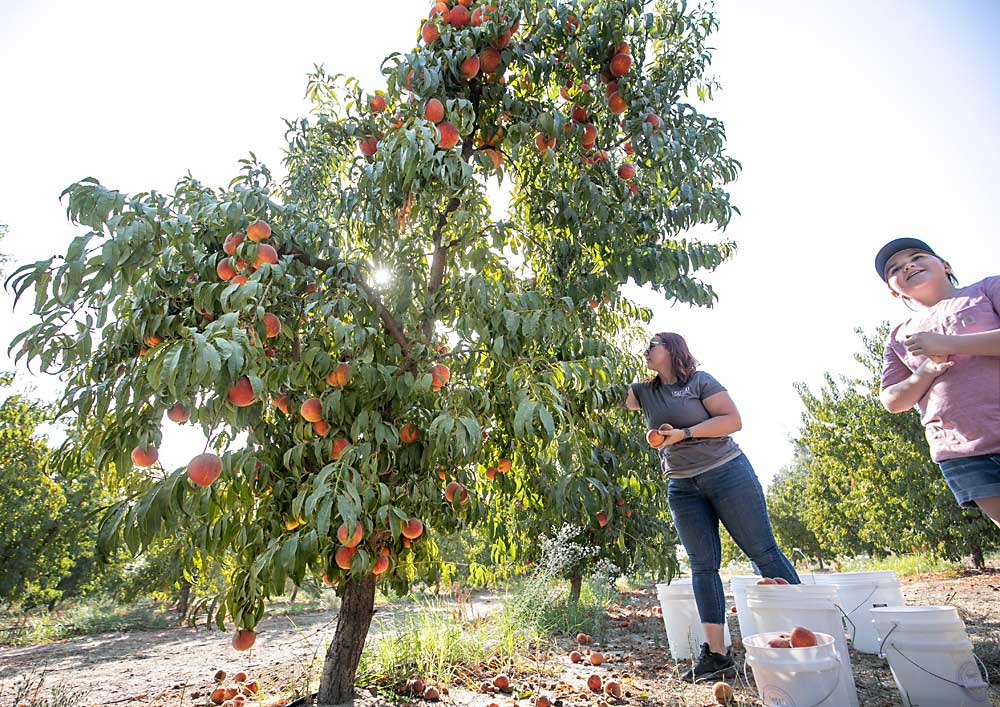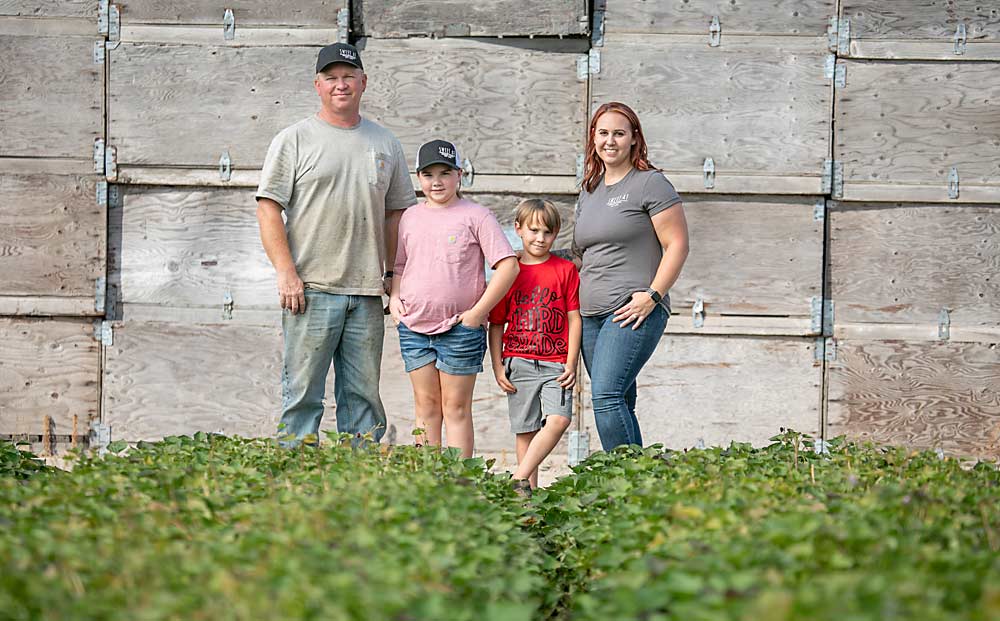—story by Ross Courtney
—photos by TJ Mullinax

Growers Craig and Amanda Arnold are constantly searching for the sweet spot of peach production scale.
The Winton, California, farming couple grows most of their peaches for processing. But with permission from their canneries, they set aside six or seven trees from each block to fulfill preordered fresh sales, a business diversification they started during the pandemic.
How many trees is always a guess.
“I don’t know there is necessarily a right size, every year is so different,” Amanda said.
Even their plan for processing peaches, which they sell to Pacific Coast Producers, Dole and Wawona Frozen Foods, is in flux.
They had 200 acres until Craig, a fourth-generation grower, assumed management of the peaches when his uncle, Glenn Arnold, died in 2019. Over the next five years, they pulled back to 80 acres, removing underperforming blocks, and are in the middle of planting new varieties. They should end up with about 100 by the end of this year.
Meanwhile, their other crops have fluctuated acreage, too. They have sweet potatoes, almonds, wine grapes, peppers and even a few pomegranates.
The couple also started a bin service, hiring a year-round crew to maintain about 50,000 wooden and plastic bins that they rent out for peaches and sweet potatoes. The peach canners start leasing them in June and bring them back by October for repairs — in time for the sweet potato industry.
“You have to diversify, really diversify, or you’ll never make any money,” Amanda said.

Peach fluctuations
California peach acreage in general, whether for the fresh or processing market, had been decreasing for many years in favor of almonds, one of California’s biggest cash crops. The state produces 80 percent of the world’s almond supply, according to the Los Angeles Times. But the pandemic and tariff disputes were not kind to the export-reliant industry, and the crop’s footprint in the state has since shrunk.
Meanwhile, demand for canned and frozen fruit went up during the pandemic, when the processing peach industry set 20-year sales records, said Rich Hudgins, president and CEO of the California Canning Peach Association. The Sacramento-based cooperative negotiates year-to-year prices with canners on behalf of growers, who deliver on 20-year contracts.
Those per-ton prices have climbed at roughly the same rate as the state’s minimum wage, making peaches attractive for diversified growers. Plantings of cling peaches, the vast majority of canning peaches, took off in 2023 with 1,275 new acres, compared to a steady level of 300 to 400 new acres each of the previous four years, according to the group’s statistics.
The acreage surge has prompted the organization to warn growers to plant only under contract to avoid an oversupply.
“Obviously we’re beyond the COVID years, and retail consumption has come back down to earth,” Hudgins said.

Staying small
The Arnolds have been navigating these changes on their operation near Modesto. The fresh peach industry is centered more than an hour south, near Fresno, where large, vertically integrated producers dominate U.S. production.
The Arnolds have no interest in competing with that scale for either segment of their stone fruit game.
“I don’t ever think I want to be a 300- to 400-acre peach grower,” Craig said.
To diversify, the family started offering preordered fresh sales through the farm’s online store, with on-farm pickup, during the pandemic. It’s been popular. Customers tell Amanda the service reminds them of the days when farm stands dotted the rural county roads.
The couple branded the service “Sweet AF,” borrowing from an inside joke among them and their crews. They also offer flavored almonds, sweet potatoes and even apparel. Their kids — Addisyn, 11, and Tavin, 9 — help pick the fresh peaches and package orders.
The family likes the profit margins of the fresh sales, but scaling up will require some creativity, Craig said. Eventually, they may want to plant some designated fresh-pick blocks.
He and Amanda are converting a shipping container into a self-service sales building and talking to local restaurants about incorporating fresh peaches into their cuisine. They have received requests to send fresh peaches as gifts as far away as Maine, but first they want to test out some packaging options to make sure the fruit arrives in good condition.
“At some point we’ll try it,” Craig said. •









Leave A Comment